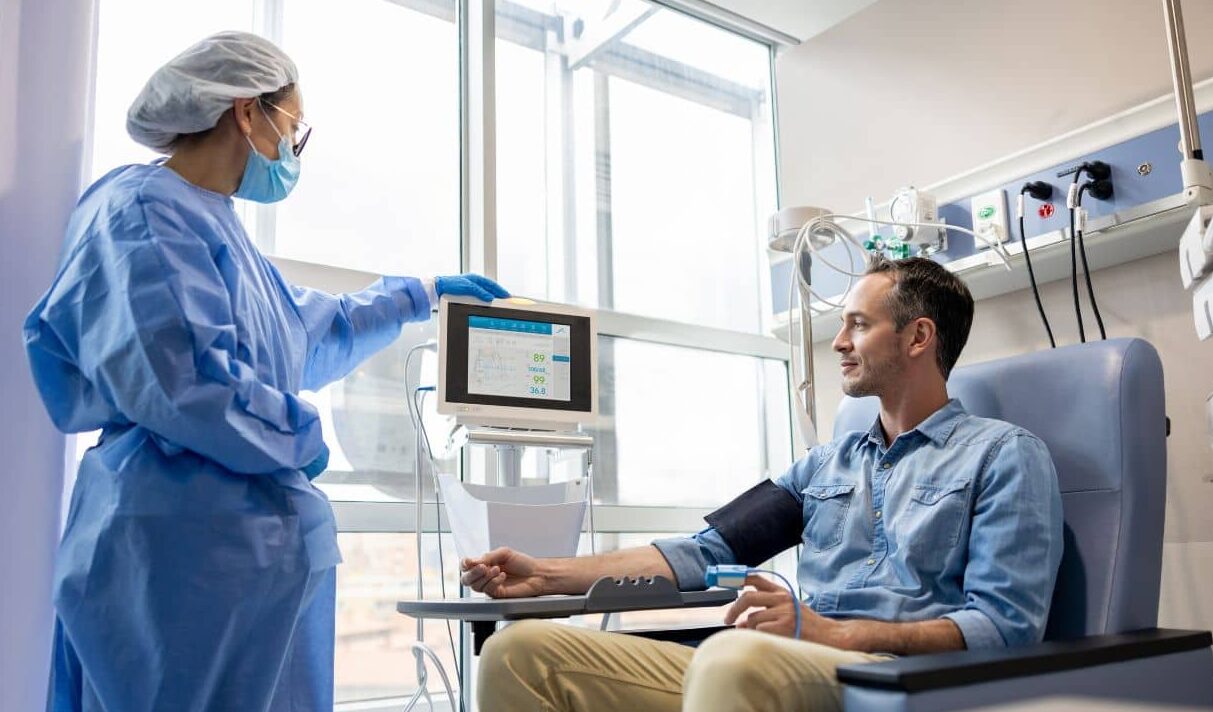-
 News
When glucose levels are low, chemotherapy ceases to affect cancer cells
News
When glucose levels are low, chemotherapy ceases to affect cancer cells
-
 News
Excessive treatment of prostate cancer in older men may reduce quality of life without increasing its duration
News
Excessive treatment of prostate cancer in older men may reduce quality of life without increasing its duration
-
 News
Brain cancer can be cured by viruses
News
Brain cancer can be cured by viruses
-
 News
Ways to reduce lymphatic pain in breast cancer have been found
News
Ways to reduce lymphatic pain in breast cancer have been found
-
 News
Scientists have turned bacteria into a powerful weapon against cancer
News
Scientists have turned bacteria into a powerful weapon against cancer
All news
Orthopedics clinics in Turkey
The orthopedics and traumatology departments of Turkish medical centers work according to international treatment protocols. Multidisciplinary clinics in Turkey are certified by the JCI International Commission. This means that medical institutions meet more than 1 500 requirements and have successfully passed accreditation.
Turkish hospitals that treat patients with pathologies of the spine, limbs and joints are equipped with modern equipment. Highly specialized specialists undergo training with leading surgeons and orthopedists abroad. At the same time, prices for medical services in Turkey are about 40% lower than in hospitals in the United States and Europe.
MedTour patients recommend clinics for the treatment of orthopedic in Turkey:
Doctors for the treatment of orthopedics in Turkey
Frequently Asked Questions
For the treatment of pathologies of the musculoskeletal system, doctors can use special intra-articular injections. Such medicines are effective for arthritis, arthrosis and other joint diseases. This helps relieve pain, reduce swelling and restore joint mobility.
Doctors in Turkish clinics practice innovative methods of treating the shoulder joint. One of the most effective treatments for rotator cuff injuries is the InSpace Balloon technology. The surgeon can use 2 approaches to implantation – arthroscopic and through minimal incisions. After fixing the balloon in the space between the acromion (part of the scapula) and the head of the humerus, the balloon is filled with saline. Thanks to this, painful friction between the bones does not occur, which contributes to the patient’s recovery.
Most often, Turkish surgeons perform joint replacement for osteoarthritis (destruction of articular cartilage), rheumatoid or post-traumatic arthritis. Also, patients can seek medical help from Turkish specialists in order to carry out a planned joint replacement.
To make an appointment with a doctor and undergo surgical treatment of a joint in Turkey, leave a request on the MedTour website. Our coordinating doctor will advise you and help you organize treatment in the best Turkish hospital.
The cost of joint or spine treatment in a clinic in Turkey will depend on a number of factors:
- Pricing policy of a medical institution;
- Doctor’s qualifications and popularity;
- Operation technique;
- The cost of the implant and other consumables that will be used to treat bone pathology;
- Additional medications may be prescribed to treat complex injuries and infections.
In some cases, a rehabilitation program may be recommended to the patient. This will complement the item of expenditure, including the period of residence in the country.
Some Turkish clinics operate on an «all inclusive» system, which does not require additional payments for certain types of services (transfer, meals, translator) and allows you to significantly save on travel.
To choose the most suitable treatment option, contact the MedTour coordinator. Our specialist will help you choose a clinic and a doctor, guide you on the cost of treatment and prepare all the necessary documents.
The cost of treatment may include additional diagnostics so that the doctor receives complete information about the patient’s condition.
Examples of the cost of operations in the TOP clinics in Turkey:
- Hip replacement — from $9 000;
- Arthroscopic surgeries — from $4 000;
- Surgery to remove a hernia of the spine — from $5 000;
- Surgical treatment of scoliosis — from $20 000.
The cost of other operations for the treatment of the musculoskeletal system, you can check with the coordinator of MedTour. Leave a request on the site and get a free specialist consultation. You will be able to agree on the date of your trip to the Turkish clinic and undergo treatment at the time you need.
Diagnostics in Turkey in orthopedics and traumatology
To make an accurate diagnosis and select the optimal treatment option, Turkish doctors use modern equipment and new technologies. The following examinations are carried out in clinics:
- X-ray;
- CT and MRI;
- Scintigraphy — examination of bones to identify a pathological process;
- Densitometry is an assessment of bone mineral density.
Computer and magnetic resonance imaging using the latest equipment allows the doctor to reliably assess the condition of the patient’s soft and bone tissues. A traumatologist and orthopedist can identify fractures, injuries to tendons, ligaments, cartilage, and muscles. With pathologies of the spine, CT and MRI can detect tumors, protrusions and intervertebral hernias.
Thanks to the scintigraphy procedure, the doctor identifies fractures, benign and malignant tumors, infections that affect bone tissue. This examination allows the orthopedist to assess the quality of the prosthesis installation.
Densitometry is performed for the detailed diagnosis of osteopenia and osteoporosis. The procedure allows detecting bone diseases at an early stage (in comparison with other methods), when the treatment can be most effective.
Orthopedic surgery in Turkey
All modern types of surgical treatment of the musculoskeletal system are available in Turkish clinics. Doctors perform spinal surgeries, joint replacements and surgical treatments for scoliosis, even in the most difficult medical cases.
Endoprosthetics
In Turkish clinics, specialists perform the following types of joint replacement operations:
- Total arthroplasty — a joint with pathology is completely replaced with a high-quality prosthesis;
- Partial joint replacement — the doctor replaces only the damaged parts of the joint;
- Revision arthroplasty is a repeated replacement of an artificial joint.
There are options for open and arthroscopic surgery — according to individual indications. With an open intervention, the surgeon performs actions through one incision up to 20 cm.For the arthroscopic procedure, the doctor makes 3-4 thin punctures up to 1 cm in size.
Spine surgery
Spinal surgery is necessary in the presence of tumors, hernias, stenosis of the spinal canal and diseases of the joints of the spinal column.
The following types of spine treatments are available in Turkish hospitals:
- Prosthetics is an operation to replace a damaged vertebra with an artificial one. The procedure is necessary when there are risks of spinal instability after removal of the disc.
- Spine stabilization — fixation of intervertebral discs using special support systems. The doctor performs stabilization surgery if the spinal column is unable to maintain a normal body position.
- Laminectomy (decompression) — the operation allows you to relieve the pressure of the tumor on the nerve endings. The doctor removes a small area of bone near the damaged nerves.
- Discectomy is an operation that allows you to restore the sensitivity of nerve endings, and thus relieve pain and numbness in the extremities. If indicated, the surgeon partially or completely removes the intervertebral disc.
In Turkish hospitals, doctors mainly carry out low-traumatic operations through small punctures up to 1 cm in diameter. Thanks to this method, the patient recovers faster after treatment.
Treating severe scoliosis
Turkish doctors prefer spinal fusion for the treatment of scoliosis. During the operation, the surgeon removes the curvature of the spinal segments. To exclude further damage to the spine, the doctor fixes special metal rods, screws and plates on it.
The doctor can perform spinal fusion using an open method or endoscopic. The advantage of the endoscopic method is that the operation takes place through 3-4 thin punctures (with an open version of the surgical intervention, an incision of 20-25 cm may be required). The recovery time varies from 10 days to 3 weeks, depending on the chosen technique and the volume of surgery.
Published:
Updated:


Information on this webpage verified by the medical expert






